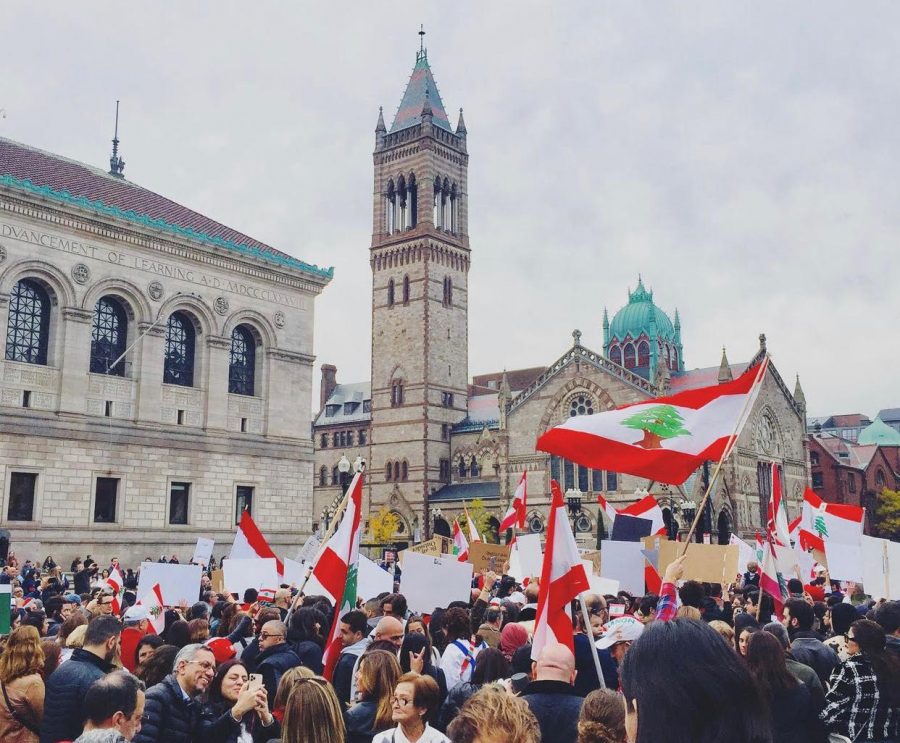Protests have once again erupted across Lebanon and the Lebanese communities around the world, over a year after the explosion in Beirut, the nation’s capital, on Aug. 4, 2020.
The explosion caused 218 deaths and displaced over 300,000 others. According to Forbes, the blast was rated 3.3 on the seismic scale, making it one of the largest non-nuclear explosions in history. It was so powerful that it was felt across neighboring Israel, Palestine and Syria, and was even heard in Cyprus, nearly 150 miles off the Lebanese coast.
The protests came in response to the Lebanese government’s lack of accountability for the role they played in the explosion, which was believed to be triggered by the government allowing cargo ships to poorly store ammonium nitrate next to fireworks in the Port of Beirut for several years.
According to Al Jazeera, there have already been ongoing protests against the government since 2019. These demonstrations called upon the people of Lebanon to protest the decades of corruption, crippling economy, high taxes, high unemployment, rapid inflation rate, foreign interventions in the country and the sectarian conflict between different political parties.
The majority of problems are remnants from the Lebanese Civil War, which lasted from 1975 until 1990. This war was characterized by widespread violence between religious and political groups, and led to parts of the country being occupied by Israel and Syria until the early 2000s.
Lebanon, being religiously diverse, is home to one of the largest Christian populations in the Middle East, as well as significant Sunni and Shia Muslim populations, and also other religious minorities such as the Druze and Jews.
The Lebanese government is also divided based on religion. According to the National Pact drafted in 1943, the president must be Maronite Catholic, the prime minister must be Sunni Muslim, the speaker of the house must be Shia Muslim, and the deputy speaker of the house must be a Greek Orthodox Christian.
In addition to the religious divides, elected officials are often selected through nepotism, as there have been long lines of political families in power such as the Gemayel, Chamoun, Frangieh, Hariri and Jumblatt families.
The explosion at the Port of Beirut was seen as the final blow to these increasing issues, and sparked protests and riots all across the country and amongst Lebanese communities across the world, all directed at the government which they accused of being responsible for the deaths of Lebanese civilians due to their corruption and greediness.
On Aug. 4, 2021, protests occurred at the site of the explosion with protestors holding the names of victims who lost their lives in the explosion. Lebanese flags were waved and banners were shown stating that the Lebanese government has “blood on their hands,” Mic reported.
In Boston, protests against the Lebanese government were held in 2019, and a vigil was held in 2020 and 2021 at the Khalil Gibran Memorial across from the Boston Public Library. Suffolk University students Karine Kanj, Pamela Saad and Angela El Jazzar were amongst the protesters.
“Problems in Lebanon have been brewing for years,” El Jazzar said. “Whether it be economic turmoil, corruption, or distrust in our governing leaders, people have taken their voices to the streets and demanded change. Yet, a year after the August 4 explosion, people still are demanding answers.”
When asked what the Suffolk University community and other Americans can do to help the situation in Lebanon, El Jazzar explained that it could be as simple as spreading awareness and raising donations.
“Economic stability is something our people are longing for, as they are continuing to face daily power cuts, a lack of safe drinking water, limited public healthcare, and some of the world’s worst internet connections,” El Jazzar said. Through three different fundraisers, I was able to raise over $5,000 that was used to distribute food to 50 houses, as well as pay for school programs and school supplies for over 150 children.”
As of September 2021, the protests are still ongoing, despite the resignation of Prime Minister Saad Hariri in the aftermath of the explosion. President Michel Aoun remains in office since 1988, making him one of the longest lasting administrations still in power in the world.







